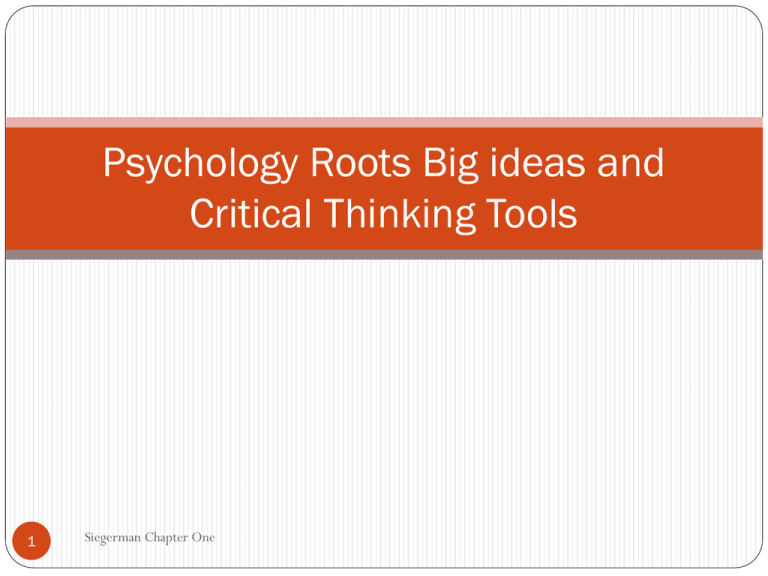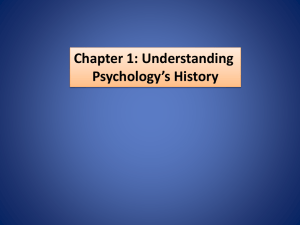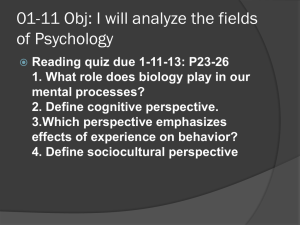
Psychology Roots Big ideas and
Critical Thinking Tools
1
Siegerman Chapter One
Psychology
With hopes of satisfying curiosity, many people
listen to talk-radio counselors and psychics to
learn about others and themselves.
http://www.photovault.com
http://www.nbc.com
Dr. Crane (radio-shrink)
2
Siegerman Chapter One
Psychic (Ball gazing)
Psychology’s Roots
Aristotle (384-322 B.C.)
http://faculty.washington.edu
Aristotle, a naturalist and philosopher, theorized about
psychology’s concepts. He suggested that the soul and body are not
separate and that knowledge grows from experience.
3
Siegerman Chapter One
Dec 1879 Psychology is born
Wilhelm Wundt creates a machine that measures the speed people
can tap a telegraph key
This is psychology’s first experiment
Psychology has some very early pioneers
Wundt was both a philosopher and physiologist.
Charles Darwin was an English Naturalist
Ivan Pavlov was a Russian Physiologist
Sigmund Freud was a personality Theorist
Jean Piaget was a Swiss Biologist
William James was an American Philosopher
4
Siegerman Chapter One
Psychology Early Pioneers
May Caulkins worked with William James was denied her
Ph.D. because she was a women. She would later go on to be
the president of APA.
Margaret Flog Wasburn – 1st Women to receive a P.h.D in
Psychology.
5
Siegerman Chapter One
Psychology developed at any leveles by
many people
The definition of Psychology has changed over the years.
1st the science of mental life
1920’s John B. Watson and later B.F. Skinner stated that
Psychology must be “ The Scientific study of observable
behavior”
Behaviorists were one of two major forces in psychology well
in the 1960’s
Humanistic rejected the Definition of Psychology, this was
lead by Carl Rodgers and Abraham Maslow, they also found
that Freudian and Behaviorism was too limiting.
6
Siegerman Chapter One
Psychological Science is Born
Freud (1856-1939)
Sigmund Freud, an Austrian physician, and his followers
emphasized the importance of the unconscious mind and its effects
on human behavior.
7
Siegerman Chapter One
Psychological Science Develops
Rogers (1902-1987)
http://www.carlrogers.dk
8
http://facultyweb.cortland.edu
Maslow (1908-1970)
Humanistic Psychology
Maslow and Rogers emphasized current environmental
influences on our growth potential and our need for love and
Siegerman Chapter One
acceptance.
Rodgers and Maslow
Drew attention to ways that a Positive Environment can
enhance our growth and to our needs for love and
acceptance.
Defining Humanism- emphasized the Growth potential of
healthy people and the individual’s potential for personal
growth.
The rebellion of the 1960’s is called the COGNITIVE
REVOLUTION which led the field back to the Mental
Processes that humans use.
9
Siegerman Chapter One
TODAY
We use science to find out how our mind perceives,
processes and remembers information.
Cognitive Neuroscience has enriched our understanding of
brain activity
The Current definition of Psychology is the scientific study of
behavior and mental processes.
Behavior is anything a human or nonhuman animal does. Any
action we can observe and record.
10
Siegerman Chapter One
Today continued
Mental processes are internal states we infer from behavior:
oThoughts
oBeliefs
oFeelings
11
Siegerman Chapter One
Psychology’s Subfields: Research
Psychologist
Biological
Developmental
Cognitive
Personality
Social
What she does
Explore the links between brain and
mind.
Study changing abilities from womb to
tomb.
Study how we perceive, think, and solve
problems.
Investigate our persistent traits.
Explore how we view and affect one
another.
Siegerman Chapter One
12
Psychology’s Current Perspectives
Perspective
Focus
Sample Questions
Neuroscience
How the body and brain
enables emotions?
How are messages
transmitted in the body? How
is blood chemistry linked with
moods and motives?
Evolutionary
How the natural selection
of traits the promotes the
perpetuation of one’s
genes?
How does evolution influence
behavior tendencies?
Behavior genetics How much our genes and
our environments
influence our individual
differences?
Siegerman Chapter One
To what extent are
psychological traits such as
intelligence, personality,
sexual orientation, and
vulnerability to depression
attributable to our genes? To
our environment?
13
Psychology’s Current Perspectives
Perspective
Focus
Sample Questions
Psychodynamic
How behavior springs
from unconscious drives
and conflicts?
How can someone’s
personality traits and
disorders be explained in
terms of sexual and
aggressive drives or as
disguised effects of unfulfilled
wishes and childhood
traumas?
Behavioral
How we learn observable
responses?
How do we learn to fear
particular objects or
situations? What is the most
effective way to alter our
behavior, say to lose weight or
quit smoking?
Siegerman Chapter One
14
Four Big Ideas in Psychology
Critical Thinking is Smart Thinking
2. Behavior is a Biopsychosocial Event
3. We Operate with a Two-Track Mind (Dual
Processing)
4. Psychology Explores Human Strengths as
Well as Challenges
1.
15
Siegerman Chapter One
Big Idea #1 Critical Thinking
Is smart thinking
Thinking that does not blindly accept arguments and
conclusions
It examines assumptions, uncovers hidden values, weights
evidence, and assesses conclusions.
16
Siegerman Chapter One
Big Idea #2 Biopsychosocial Approach
An integrated approach that
incorporates different but
complementary views from
biological, psychological , and
social-cultural perspectives.
Nature versus Nurture
17
Siegerman Chapter One
Big Idea #3 Dual Processing
The Principle that information is
often simultaneously processed
on separate conscious and
unconscious tracks in our brains.
18
Siegerman Chapter One
Big Idea #4 Explaining human Strength
Martin Seligman- Positive Psychology-
the Study of Positive Emotions, positive
characters traits, and enabling
institutions.
19
Siegerman Chapter One
Why do Psychology?
Is psychology intuition?
Hunches are good!
Critical Thinking means checking
assumptions, weighing evidence,
inviting criticism and testing
conclusions.
20
Siegerman Chapter One
Two common flaws in Intuitive thinking
1 Hindsight bias- tendency to believe after learning an
outcome that one would have fore seen it.
Overconfidence
A point to remember : Hindsight bias and overconfidence often
lead us to over estimate our intuition.
21
Siegerman Chapter One
The Scientific Attitude
3 Basic attitudes toward the
scientific Attitude
Curiosity
Skepticism
Humility
22
Siegerman Chapter One
The Scientific Method
In science a Theory explains behaviors or events by offering
ideas that organize what we have observed .
Hypothesis- a testable prediction
Research and observation
The case study
The Survey
Wording Effects
Random Sampling
Naturalistic Observation
23
Siegerman Chapter One
Research Process
24
Siegerman Chapter One
Correlation
When one trait or behavior accompanies another, we
say the two correlate.
Indicates strength
of relationship
(0.00 to 1.00)
Correlation
coefficient
Correlation Coefficient is a
statistical measure of the
relationship between two variables.
25
Siegerman Chapter One
r = + 0.37
Indicates direction
of relationship
(positive or negative)
Correlation and Causation
Correlation does not mean causation!
or
26
Siegerman Chapter One
Positive Correlation
Between 0 and +1.00 indicates a direct relationship
Increase or decrease together
i.e. height correlates positively with weight in growing children
Siegerman Chapter One
27
Negative Correlation
An inverse relationship 0 between -
1.00
As one increases the other
decreases.
Siegerman Chapter One
28
Correlations
Help us predict
Correlations indicates the possibilities
of a cause and effect relationship, but it
does not prove causation.
Siegerman Chapter One
29
Illusory Correlation
The perception of a relationship where no relationship
actually exists. Parents conceive children after adoption.
Adopt
Confirming
evidence
Disconfirming
evidence
Do not
adopt
Disconfirming
evidence
Confirming
evidence
Siegerman Chapter One
Michael Newman Jr./ Photo Edit
Conceive
Do not
conceive
30
A fact to remember
When we notice random
coincidences we may forget
that they are random
Siegerman Chapter One
31
Experimentation
Exploring Cause and Effect
Like other sciences, experimentation is the
backbone of psychological research. Experiments
isolate causes and their effects.
Siegerman Chapter One
32
Exploring Cause & Effect
Many factors influence our behavior. Experiments
(1) manipulate factors that interest us, while other
factors are kept under (2) control.
Effects generated by manipulated factors isolate
cause and effect relationships.
33
Siegerman Chapter One
Evaluating Therapies
Double-blind Procedure
In evaluating drug therapies, patients and
experimenter’s assistants should remain
unaware of which patients had the real
treatment and which patients had the placebo
treatment.
34
Siegerman Chapter One
Evaluating Therapies
Random Assignment
Assigning participants to experimental (breastfed) and control (formula-fed) conditions by
random assignment minimizes pre-existing
differences between the two groups.
35
Siegerman Chapter One
Independent Variable
An independent variable is a factor manipulated
by the experimenter. The effect of the independent
variable is the focus of the study.
For example, when examining the effects of breast
feeding upon intelligence, breast feeding is the
independent variable.
36
Siegerman Chapter One
Dependent Variable
A dependent variable is a factor that may change
in response to an independent variable. In
psychology, it is usually a behavior or a mental
process.
For example, in our study on the effect of breast
feeding upon intelligence, intelligence is the
dependent variable.
37
Siegerman Chapter One
Experimentation
A summary of steps during experimentation.
38
Siegerman Chapter One
Comparison
Below is a comparison of different research methods.
39
Siegerman Chapter One
Frequently Asked Questions About
Psychology
Q1. Can laboratory experiments illuminate
everyday life?
Ans: Artificial laboratory conditions are created to
study behavior in simplistic terms. The goal is to
find underlying principles that govern behavior.
40
Siegerman Chapter One
FAQ
Q2. Does behavior depend on one’s culture and gender?
Ans: Even when specific attitudes and behaviors vary across
cultures, as they often do, the underlying processes are much the
same. Biology determines our sex, and culture further bends the
genders. However, in many ways woman and man are similarly
human.
Ami Vitale/ Getty Images
Siegerman Chapter One
41
FAQ
Q3. Why do psychologists study animals, and is it ethical
to experiment on animals?
Ans: Studying animals gives us the understanding of many
behaviors that may have common biology across animals
and humans. From animal studies, we have gained insights
to devastating and fatal diseases. All researchers who deal
with animal research are required to follow ethical
guidelines in caring for these animals.
Siegerman
Chapter
One
D. Shapiro,
© Wildlife
Conservation Society
42
FAQ
Q4. Is it ethical to experiment on people?
Ans: Yes. Experiments that do not involve any
kind of physical or psychological harm beyond
normal levels encountered in daily life may be
carried out.
43
Siegerman Chapter One
FAQ
Q5. Is psychology free of value judgments?
Ans: No. Psychology emerges from people who
subscribe to a set of values and judgments.
Siegerman Chapter One
© Roger Shepard
44
FAQ
Q6. Is psychology potentially dangerous?
Ans: It can be, but is not when practiced
responsibly. The purpose of psychology is to
help humanity with problems such as war,
hunger, prejudice, crime, family dysfunction,
etc.
45
Siegerman Chapter One









